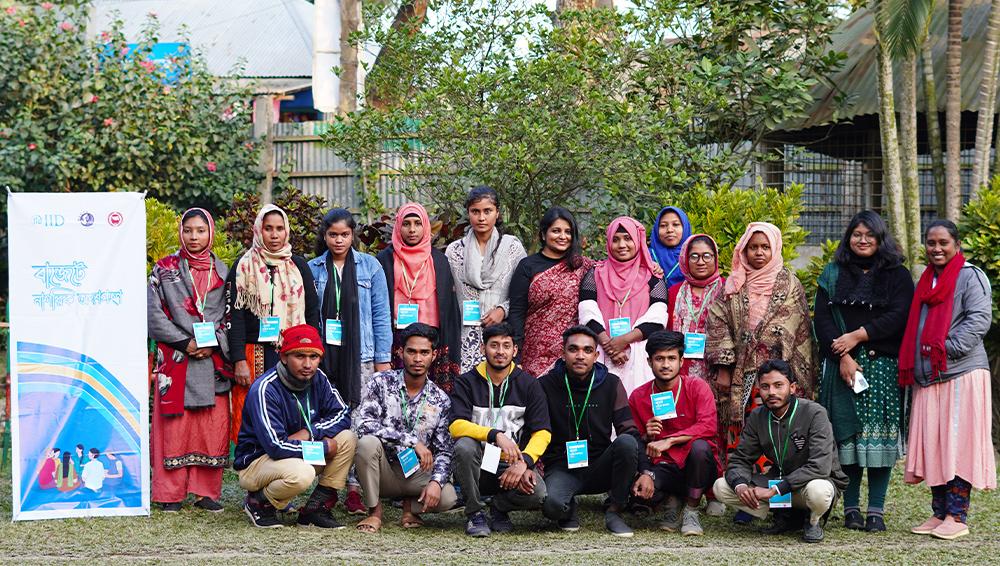The third policy discussion on “Funding Inclusion for Disability Art” delved into the necessity of inter-ministerial collaboration and strategic partnerships to promote funding and accessibility for persons with disabilities. This insightful panel was part of the International Disability Art Festival 2024, which took place on April 26-27 at the Bangladesh Shilpakala Academy.
The festival, co-hosted by the British Council, Dhaka Theatre, and IID, with support from the Parliamentary Caucus on Justice, the Ministry of Cultural Affairs, and Bangladesh Shilpakala Academy, featured ten theaters by persons with disabilities from Bangladesh and abroad, three panel discussions, and an exhibition. The event aimed to foster inclusion and empower the artistic expression of individuals with disabilities.
The discussion panel, moderated by Bahashkar Bhattacharjee, National Consultant for Access to Information (a2i), brought together eminent personalities from various government and non-government sectors. Each panelist shared their insights on enhancing accessibility and inclusion within the arts for persons with disabilities.
Tanvir Shakil Joy MP, Chair, Parliamentary Caucus on Justice underscored the essential role of inter-ministerial coordination in mobilizing resources for disability arts. He drew on his experiences from the Ministry of Climate Change and Environment to illustrate successful examples of such coordination, emphasizing the broader benefits of inclusive policies that cater to the needs of persons with disabilities.
Nafriza Shayma, Additional Director, Ministry of Cultural Affairs, highlighted the necessity of not only framing effective policies but also ensuring their implementation. She pointed out the crucial role of advocacy and proper representation of persons with disabilities in parliament, which could significantly articulate and address their unique needs.
Md. Abdul Wadud Dara, State Minister, Ministry of Local Government, Rural Development, and Co-operatives (LGRD) stressed the importance of integrating disability considerations into broader poverty eradication efforts. His ministry’s commitment to tailoring initiatives to better serve persons with disabilities was a key point of his address.
Shahidul Haque, Founder Chief Executive Officer at SARPV brought a refreshing perspective, advocating for a shift from viewing disability merely as a medical issue to recognizing it as a significant developmental concern. He emphasized the importance of creating inclusive environments that ensure equal opportunities for all, regardless of physical abilities.
Julian Francis, Development and Disability Consultant shared touching personal stories and decades of advocacy, which have shaped significant policies and initiatives aimed at empowering persons with disabilities through the arts. His emphasis on the transformative power of creativity highlighted the ongoing need for resource allocation and the importance of up-to-date data for effective policy making.
Michelle Rolfe, Producer, Birds of Paradise focused on the practical aspects of integrating accessibility into arts projects from the start. She advocated for partnerships with disability organizations and stressed the importance of interdisciplinary collaboration among various ministries to enhance accessibility initiatives.
Finally, Syeed Ahamed, CEO, IID wrapped up the discussion by reflecting on the robustness and indomitable spirit of the artworks displayed. He highlighted the productive discussions that had taken place, pointing to an emerging commitment to improving accessibility and representation for individuals with disabilities in the arts. Ahamed also raised critical points on the financing of these initiatives, suggesting a thorough exploration of government policies and funding mechanisms to support these vital efforts.
In conclusion, the panel discussion not only highlighted the critical issues facing disability arts but also fostered a dialogue that bridged diverse perspectives, laying a foundation for actionable strategies to finance and implement inclusive practices in the arts.
“Follow us on Flickr for more updates and photos: https://flic.kr/ps/43JzRH”



